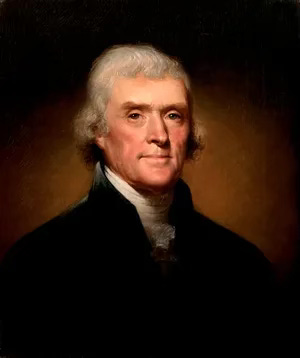When we were in school, we suspected that history was just a long string of important dates. Of course, it was more than that—but since they were what were on the tests, we assumed that they were the only things that mattered.
We knew (or were supposed to know) that the American Revolution started (more or less) in 1776, and lasted until 1781. We learned that the Founding Fathers were steeped in the heady ideals of The Enlightenment—a period that ran (roughly) from the seventeenth through the eighteenth centuries. The exact dates varied, depending on which historian chose which significant dates as markers.
That imprecision felt like a threat to those of us who expected to face multiple-choice questions.
In time, we (or some of us) learned that History was fairly good at marking the beginning of things, but is a little fuzzy about endings—especially when dealing with ideas. Events, obviously, occurred at specific moments—but when does an idea end? We can say that The Romantic Movement began with the publication of Lyrical Ballads: with A Few Other Poems, by Samuel Taylor Coleridge and William Wordsworth, in 1798. It’s not so easy to say when The Romantic Movement ended.
If it ever did.
Likewise, if we think about the brilliant and life-affirming ideas of The Enlightenment—the ideas that made our young country possible—it could be argued that the creation of the Royal Society of London for Improving Natural Knowledge, in 1662, marked The Enlightenment’s true beginning. From then on, rational thought was to be the basis for decisions—not traditions nor mysticism.
History is full of dates (such as the fall of Rome, in 476 CE), but—so far—has not been able to establish a firm date for the end of The Enlightenment. That’s because we don’t know when we stopped believing in the ideals of The Enlightenment.
Until now.
Paid subscribers get access to complete editions of two of my novellas. Noirvella is a modern story of revenge, told in the style of film noir. Unbelievable is a kind of rom-com that forms around a pompous guy who is conceited, misinformed, and undeservedly successful. Both books are sold by Amazon, but paid subscribers get to read them for free.
Also, substack pages (older than eight months) automatically slip behind a paywall—so only paid subscribers can read them. If you’re interested in reading any of them, you can subscribe (giving you free access to them), or buy them in book form should you prefer the feel of a physical book.
Meanwhile, it is easy to become a paying subscriber (just like supporting your favorite NPR station). It’s entirely optional, and—even if you choose not to do so—you’ll still get my regular substack posts—and I’ll still be happy to have you as a reader.










Please god... more Ironic points of light.
The sooner the better.
September 1, 1939
--W. H. Auden
I sit in one of the dives
On Fifty-second Street
Uncertain and afraid
As the clever hopes expire
Of a low dishonest decade:
Waves of anger and fear
Circulate over the bright
And darkened lands of the earth,
Obsessing our private lives;
The unmentionable odour of death
Offends the September night.
Accurate scholarship can
Unearth the whole offence
From Luther until now
That has driven a culture mad,
Find what occurred at Linz,
What huge imago made
A psychopathic god:
I and the public know
What all schoolchildren learn,
Those to whom evil is done
Do evil in return.
Exiled Thucydides knew
All that a speech can say
About Democracy,
And what dictators do,
The elderly rubbish they talk
To an apathetic grave;
Analysed all in his book,
The enlightenment driven away,
The habit-forming pain,
Mismanagement and grief:
We must suffer them all again.
Into this neutral air
Where blind skyscrapers use
Their full height to proclaim
The strength of Collective Man,
Each language pours its vain
Competitive excuse:
But who can live for long
In an euphoric dream;
Out of the mirror they stare,
Imperialism's face
And the international wrong.
Faces along the bar
Cling to their average day:
The lights must never go out,
The music must always play,
All the conventions conspire
To make this fort assume
The furniture of home;
Lest we should see where we are,
Lost in a haunted wood,
Children afraid of the night
Who have never been happy or good.
The windiest militant trash
Important Persons shout
Is not so crude as our wish:
What mad Nijinsky wrote
About Diaghilev
Is true of the normal heart;
For the error bred in the bone
Of each woman and each man
Craves what it cannot have,
Not universal love
But to be loved alone.
From the conservative dark
Into the ethical life
The dense commuters come,
Repeating their morning vow;
"I will be true to the wife,
I'll concentrate more on my work,"
And helpless governors wake
To resume their compulsory game:
Who can release them now,
Who can reach the deaf,
Who can speak for the dumb?
All I have is a voice
To undo the folded lie,
The romantic lie in the brain
Of the sensual man-in-the-street
And the lie of Authority
Whose buildings grope the sky:
There is no such thing as the State
And no one exists alone;
Hunger allows no choice
To the citizen or the police;
We must love one another or die.
Defenceless under the night
Our world in stupor lies;
Yet, dotted everywhere,
Ironic points of light
Flash out wherever the Just
Exchange their messages:
May I, composed like them
Of Eros and of dust,
Beleaguered by the same
Negation and despair,
Show an affirming flame.